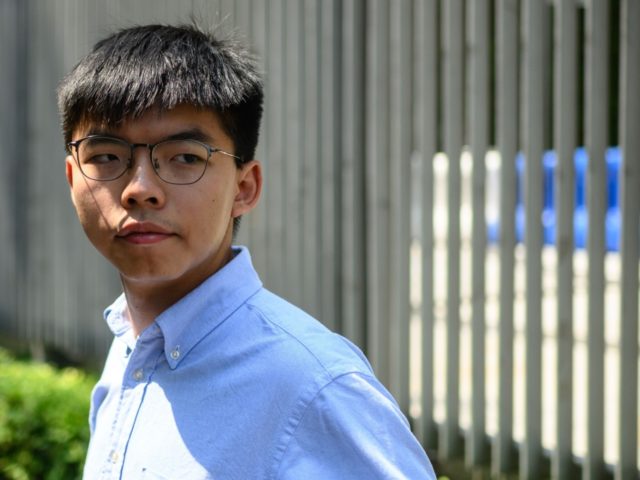Several prominent Hong Kong pro-democracy activists said on Monday they have been followed and filmed by mysterious stalkers they believe are Chinese security agents.
The surveillance appears to be intensifying as Beijing prepares to impose a draconian new national security law on Hong Kong, bypassing its legislature.
Pro-democracy leader Joshua Wong said he and several of his associates were followed around by four-man plainclothes squads after they had a meeting on Saturday night. When they confronted one of the stalkers and asked if he was working for Chinese or Hong Kong security, he waved an umbrella at them, accused them of trying to rob him, and departed in a taxicab. A suspicious white car that seemed connected with the stalkers chose that moment to drive away as well.
Wong said he has been followed by a “suspicious middle-aged man in a private car” for the past week. When he visited the offices of Demosisto, the advocacy group he leads as general secretary, the man began taking photos of him.
“Maybe this happens all the time in Mainland China, but Hong Kong is supposed to be different. After all, the national security law still hasn’t been passed. So why are activists and councillors being monitored every single day?” Wong asked on Twitter after the incident.
“Political surveillance with a chilling effect, sadly, has become the new reality in Hong Kong. Everyone, please take care. Do not go out alone. Stay safe,” he warned.
Wong noted that Chinese state media has accused Demosisto of being the kind of foreign-controlled subversive militant movement the new national security law will crack down on. Some of the most hostile coverage in Chinese media paints Demosisto and other groups linked to the 2019 protest movement as little more than domestic terrorists.
On Friday night, pro-democracy legislator Jeremy Tam of the Civic Party reported a similar incident involving two stalkers who “spoke with a mainland Chinese accent.” Tam said his tails also hailed a cab and fled the scene when he confronted them.
Another legislator, Raymond Chan, said on Monday he has been contacted by a number of pro-democracy district councilors who were followed and photographed in a manner similar to Wong and Tam, including the stalkers’ habit of hailing taxicabs to make their getaways when confronted.
Pro-democracy activists in Hong Kong have long complained about being kept under surveillance by the city’s police force and Security Bureau. Even before Hong Kong was handed back to China by the United Kingdom in 1997, the party in power had a tendency to keep an eye on its opponents, often using methods that seemed clumsy enough to ensure the subjects knew they were being watched.
Democracy activists say political surveillance intensified after the Umbrella Movement protests of 2014, the high-water mark of Hong Kong civil unrest until a controversial extradition bill triggered the new wave of massive protests in 2019. According to its critics, the post-Umbrella Movement surveillance regime was more likely to employ operatives “outside the judicial system,” meaning hired gangsters from the Triad organized crime syndicates.
Chinese intelligence operatives also became more active in Hong Kong after 2014, and are thought to have played a role in the disappearance of some dissidents who later reappeared in mainland detention facilities. This rash of disappearances was one of the reasons a massive protest movement erupted after the Beijing-controlled administration of Hong Kong tried to push through a law that would make the extradition of criminal suspects to China easier.
China’s national security law is on track to take effect in Hong Kong as early as the end of this month. Chinese officials insist the law will protect Hong Kong’s autonomy under the “One Country, Two Systems” model.
Zhang Xiaoming, deputy director of China’s Hong Kong and Macau Affairs Office (HKMAO), strongly hinted over the weekend that if the security law is not put into effect, Hong Kong’s autonomy would be unlikely to survive in any meaningful sense beyond 2047, the current expiration date of the relevant agreements implemented in 1997.
“For the majority of the citizens, the legislation will give them more protection. They can be free from the fear of violence. They can ride the trains and go shopping freely. They can speak the truth on the street without fear of being attacked,” Zhang said, pushing Beijing’s view of the protest movement as dangerously subversive.
“In particular, they no longer have to worry about young people being brainwashed into breaking the law on impulse and leaving lifelong criminal records. There will be hope in Hong Kong’s future,” he added.

COMMENTS
Please let us know if you're having issues with commenting.